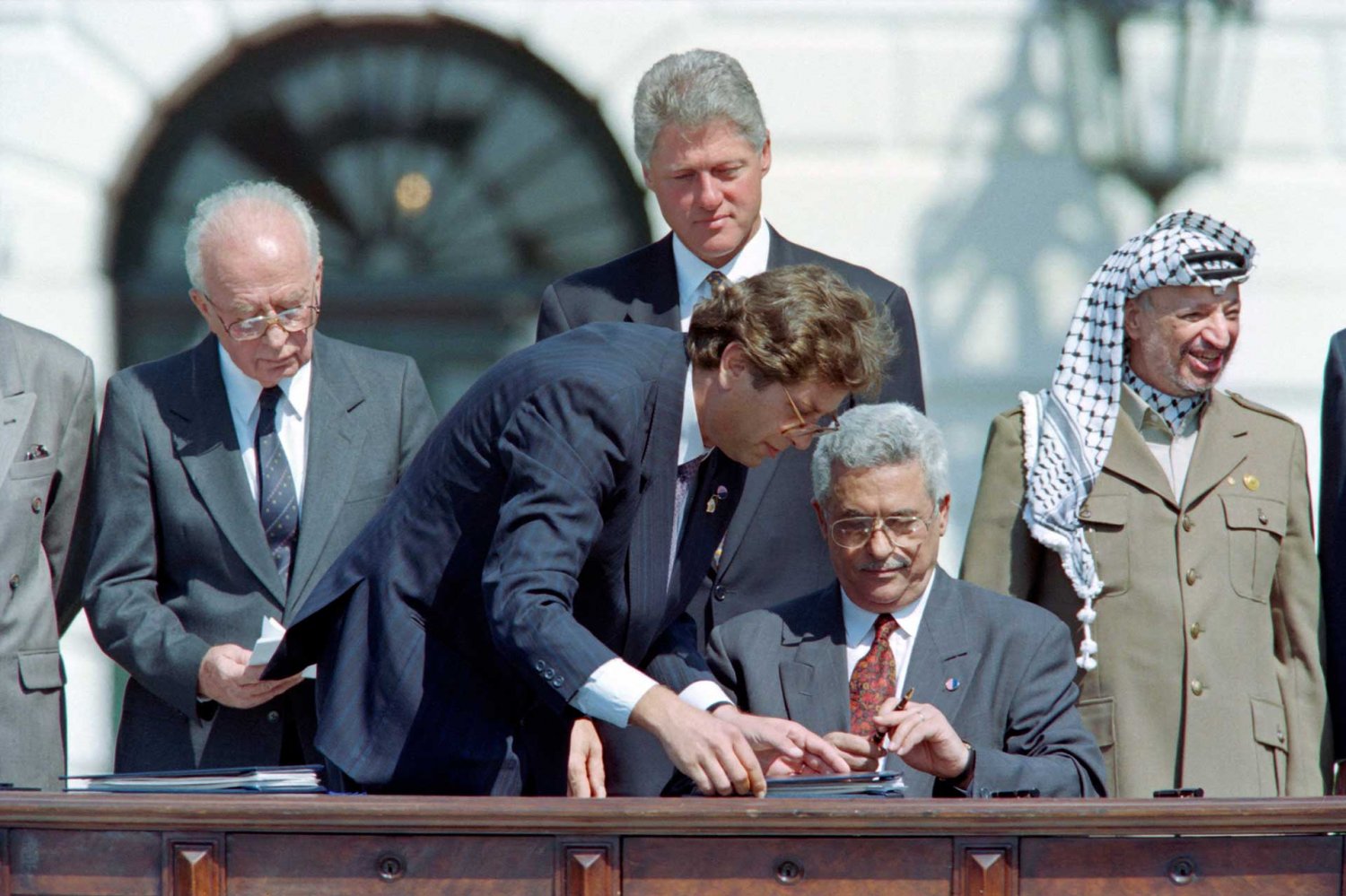On behalf of Jerusalem Story, I brought together four prominent Jerusalemites for a Roundtable on the past, present, and future of the people and the city of East Jerusalem as we come to the 30th anniversary of the signing of the Oslo Accords Declaration of Principles. On September 13, 1993, as President Yasser Arafat and Prime Minister Itzhak Rabin looked on, Shimon Peres and Mahmoud Abbas signed what seemed at the time a historic document that was purportedly the prelude to a final peace process.

Credit:
Uriel Sinai, Getty Images
Thirty Years Post-Oslo, Palestinian Jerusalemites Feel Orphaned and Leaderless
Snapshot
Jerusalemites take stock of their city and community 30 years after the signing of the Oslo Accords on September 13, 1993.
The set of agreements that is generally referred to as the Oslo Accords (consisting of the Oslo I Agreement in 1993 and the Oslo II Agreement September 1995) has proven devastating for Palestinians.
Perhaps the biggest failure of the Oslo process and the fact that the supposed “interim five-year agreement” has stretched to 30 years and counting has been its effect on East Jerusalem.
During the Roundtable discussion, which took place on Zoom on September 8, 2023, a former member of the Salam Fayyad government, the head of a fund supporting Jerusalemites, and activists including a rising female star discussed candidly the situation and came up with a few recommendations.
This is a brief summary of the discussion. A full transcript of the Roundtable can be found here.
The devastation that the Oslo Accords (and the Separation Wall and permit regime that followed) have wrought on Palestinian East Jerusalem are evident in all sectors: housing, education, business, tourism, social cohesion. Participants pointed out the schism that has taken place between Jerusalem and the rest of the occupied territories and admitted reluctantly that Israel has succeeded in beheading any effort aimed at creating a local political leadership connected with Ramallah. Much of the blame was directed at the Palestinian leadership, which clearly demoted Jerusalem from its priorities, despite giving rhetorical support to the city. This was best described by Samer Sinjalwi, the director of a fund for Jerusalemites, who noted that while East Jerusalemites represent 8 percent of the population of the occupied territories, they never received anywhere close to that percentage in the annual budget of the successive Palestinian governments, which averages around $6 billion. According to Sinjalwi, that would amount to $150 million a year for Jerusalem. Naturally he noted that 35 percent of the Palestinian budget goes to security salaries, including to 1,500 persons living in East Jerusalem and working for the Palestinian security forces, who receive a monthly salary from Ramallah.
Hazem H. Kawasmi identified housing as the biggest problem facing Jerusalemites. Today, the cost of buying an apartment tops half a million US dollars; rentals reach $1,500 monthly.
Former minister in the Salam Fayyad government Bassim Khoury, who founded and owns pharmaceutical companies in Palestine and Malta, as well as being very involved in local Jerusalem NGOs, admitted that successive Palestinian governments did not give East Jerusalem the priority that it needed. Participants agreed that blame is to be shared by all, including all Palestine Liberation Organization (PLO) and Islamic factions as well as local leaderships. With the absence of the late Faisal Husseini and the closure of the Orient House and the Chamber of Commerce, it was clear that Jerusalem lacked leadership as well as a workable strategy. Khoury, who was a member of the pre-Oslo and pre-Madrid technical committee, said that Jerusalemites were the center of all the pre-Oslo planning, but all that has now disappeared. Khoury and others repeated the term “orphans” to refer to the successful destruction of political leadership in the city that Palestinians consistently refer to as being the capital of Palestine. Most people have either accepted jobs in the Palestinian government and other Ramallah-based organizations or simply are worrying about their own futures and well-being irrespective of the collective national interest.
Civil society also was dealt a harsh blow due to the Oslo process, even though Palestinian Jerusalemites long before Oslo were active in creating a strong network of organizations that filled the gap of not having a state. Nivine Sandouka, a young activist who did not live through the Oslo era, complained that Jerusalem women’s issues and organizations have also been left out of the national debate. Funding continues to have hampered the work of civil society, including those of women’s organizations, with the bulk of international funding going to organizations that relocated to Ramallah due to the Separation Wall and to the Palestinian government not able or interested in supporting Jerusalem civil society.


